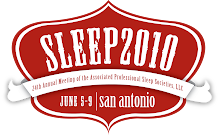“The Use of Complementary and Alternative Medicine for Sleep” is a symposium that is taking place until 10 a.m. Pacific Time. One topic being discussed is the use of meditation and yoga for the treatment of insomnia.
A small pilot study (#0874) presented yesterday reported that Kriya Yoga – a type of meditation that combines different yoga techniques – may be an effective behavioral treatment for chronic primary insomnia.
Another topic being discussed is the efficacy of acupuncture on sleep in depressed pregnant women. In February the Sleep Education Blog reported on a new scientific review of acupuncture use for insomnia. The authors conclude that acupuncture has potential as an insomnia treatment, but there is only limited evidence to support its use. Read the full report.
In 2006 the National Center for Complementary and Alternative Medicine (NCCAM), part of the National Institutes of Health, reported that more than 1.6 million American adults use some form of CAM to treat insomnia or trouble sleeping.
A 2007 study of CAM use published in the journal SLEEP reported that large segments of the U.S. population use valerian or melatonin for insomnia, and usage typically falls outside the purview of the health-care system.
Showing posts with label yoga. Show all posts
Showing posts with label yoga. Show all posts
Wednesday, June 10, 2009
Tuesday, June 9, 2009
Treating Insomnia without Drugs
Two studies being presented as posters later this morning show that non-pharmacological treatments for insomnia can be effective.
One study (#0821) concludes that when applied in a “real world” clinical setting, cognitive behavioral therapy for insomnia appears to be an effective treatment approach for various types of chronic insomnia such as sleep-onset insomnia and sleep-maintenance insomnia. Treatment produced significant improvements on presenting complaints as well as other measures such as sleep efficiency, average nightly awakenings, total sleep time and average nights of sleep medication use per week.
A small pilot study (#0874) involving 11 adults with chronic primary insomnia shows that another effective behavioral intervention may be Kriya Yoga – a type of meditation that combines different yoga techniques. Results indicate that sleep latency, total sleep time, total wake time, wake after sleep onset, sleep efficiency, sleep quality and depression improved in patients who practiced meditation for two months.
In 2006 the American Academy of Sleep Medicine published, “Practice Parameters for the Psychological and Behavioral Treatment of Insomnia: An Update” in the journal SLEEP. View the practice parameters online.
You can download the SLEEP 2009 abstract supplement as an 11 MB file in PDF format.
One study (#0821) concludes that when applied in a “real world” clinical setting, cognitive behavioral therapy for insomnia appears to be an effective treatment approach for various types of chronic insomnia such as sleep-onset insomnia and sleep-maintenance insomnia. Treatment produced significant improvements on presenting complaints as well as other measures such as sleep efficiency, average nightly awakenings, total sleep time and average nights of sleep medication use per week.
A small pilot study (#0874) involving 11 adults with chronic primary insomnia shows that another effective behavioral intervention may be Kriya Yoga – a type of meditation that combines different yoga techniques. Results indicate that sleep latency, total sleep time, total wake time, wake after sleep onset, sleep efficiency, sleep quality and depression improved in patients who practiced meditation for two months.
In 2006 the American Academy of Sleep Medicine published, “Practice Parameters for the Psychological and Behavioral Treatment of Insomnia: An Update” in the journal SLEEP. View the practice parameters online.
You can download the SLEEP 2009 abstract supplement as an 11 MB file in PDF format.
Subscribe to:
Posts (Atom)



